“I hope that in this year to come, you make mistakes. Because if you are making mistakes, then you are making new things, trying new things, learning, living, pushing yourself, changing yourself, changing your world. You're doing things you've never done before, and more importantly, you're doing something.” -Neil Gaiman
Here we are, at the end of a momentous week here at Starts With A Bang! The world is changing; the president of the world's most powerful nation has changed; but the quest to learn ever more about the Universe still continues unabated. There's so much coming down the pipeline for next week, including a revolutionary story on where our meteorites come from, a special on the black hole information paradox, the origin of the (abuse of the) anthropic principle and more! But first, let's take a look back at what we've covered this past week:
- Could you have two perfectly identical snowflakes? (for Ask Ethan),
- Cosmic cluster collision triggers trio of active galaxies (for Mostly Mute Monday),
- Prediction of merging stars may solve one of Hubble's greatest mysteries,
- A behind-the-scenes look at building the greatest telescope of all,
- Climate science isn't political. Lying about it is, and
- Can science prove the existence of God?
While we might also be putting together a fantastic podcast on the controversy over the Hubble expansion rate of the Universe, there's no point in getting ahead of ourselves. There's bonus science afoot! You've had a lot to say, and I've got a lot to highlight and respond to for this edition of our comments of the week!
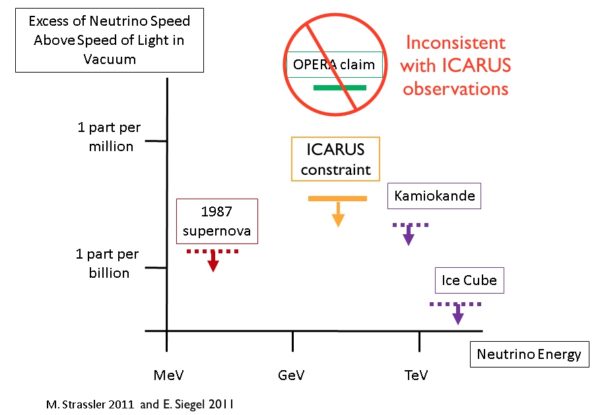 The various constraints on departures of neutrino speed from the speed of light from various experiments. All experiments display upper limits, except for OPERA's spurious positive detection. Image credit: M. Strassler (2011), modified by E. Siegel to include ICARUS and refute the initial OPERA claim.
The various constraints on departures of neutrino speed from the speed of light from various experiments. All experiments display upper limits, except for OPERA's spurious positive detection. Image credit: M. Strassler (2011), modified by E. Siegel to include ICARUS and refute the initial OPERA claim.
From Denier on scientific literacy, or the lack thereof: "When you strip out competence or knowledge from making your determination on who is or is not science literate, you’re redefining the word. I will grant that literacy can not necessarily be confined to memorized facts. Knowledge on where to get the needed knowledge, be it old college text books, published scientific literature, or even authoritative people, is just as valuable. Still science literacy has to be about competence or knowledge."
You're almost there! By which I mean, I think you've finally almost understood the point I've been attempting to make for weeks, now. You are contending that in order to be scientifically literate, one must be capable of being competent, knowledgeable, and able to distinguish between good and bad science. Between what's true and valid and what's false and invalid. Between what has merit and where, and what lacks merit and where.
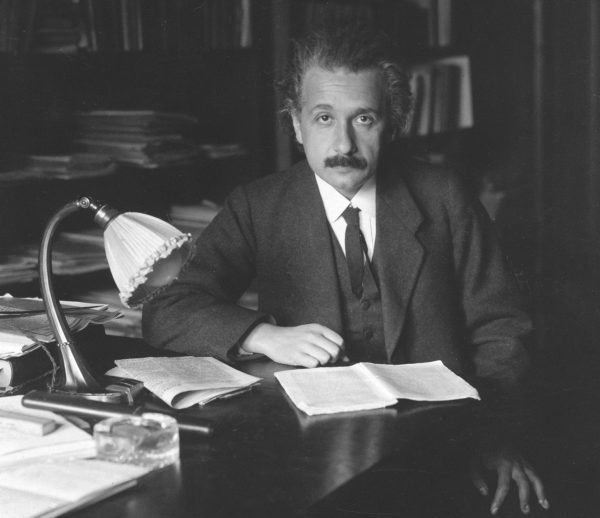 Albert Einstein in 1920. Image credit: "The Solar Eclipse of May 29, 1919, and the Einstein Effect," The Scientific Monthly 10:4 (1920), 418-422, on p. 418. Public domain.
Albert Einstein in 1920. Image credit: "The Solar Eclipse of May 29, 1919, and the Einstein Effect," The Scientific Monthly 10:4 (1920), 418-422, on p. 418. Public domain.
In other words, you must have all the skills necessary to be a scientist specialized in a particular area of science, for all areas of science. That is what's required to be scientifically literate by that definition of literacy. It is why I responded to eric as I did; it's why I respond to you as I do. Because that level of scientific literacy is not possible, nor is it desirable. It requires that we know the full extent of our knowledge and capabilities and our limitations, and this is something that no one can know. How can you know the full suite of unknown unknowns; not even your hero Donald Rumsfeld knows that!
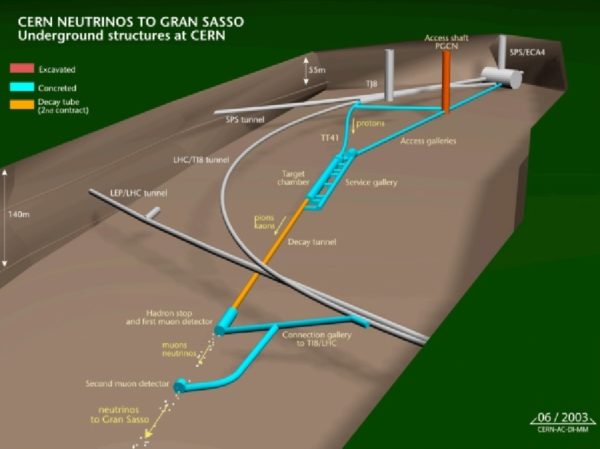 Sending any particles through hundreds of kilometers of space should always result in the particles arriving no faster than a photon would. The OPERA collaboration famously observed a faster result a few years ago. Image credit: OPERA collaboration; T. Adam et al.
Sending any particles through hundreds of kilometers of space should always result in the particles arriving no faster than a photon would. The OPERA collaboration famously observed a faster result a few years ago. Image credit: OPERA collaboration; T. Adam et al.
From eric on the same topic, and what he'd like to see: "If drawing scientific inferences is the skill you want to test for, then the way you’d do it is to test for ‘drawing valid scientific conclusions under most circumstances’ the way you, Ethan, think that can best be done."
It requires a level of self-knowledge that I would argue practically no one possesses. It is an unreasonable set of criteria. It is a test that everyone would fail. And that's why I set up the two criteria I did:
- Be aware of what science is and how it works.
- Be appreciative of those who do science and work to advance our knowledge of this world.
It involves a lot of listening. It involves a lot of respect for those who know more than you, both skill-wise and knowledge-wise. There are contributions you can make and things you can analyze for yourself, but unless you go straight to the experts who can break it all down, everyone -- even many scientists themselves -- can get it wrong. Drawing scientifically valid inferences and conclusions is a hard problem.
From Ragtag media on identical snowflakes: "I dunno. i see a lot of snowflakes that look alike lol"
And that's the difference between "alike" and identical. For snowflakes, there are many superficial similarities between them: the hexagonally symmetric structures, the apparently fractal-like nature, etc. The similarities are important to understanding how something works, which patterns emerge, etc. But if you think they all look alike, you're not looking closely enough.
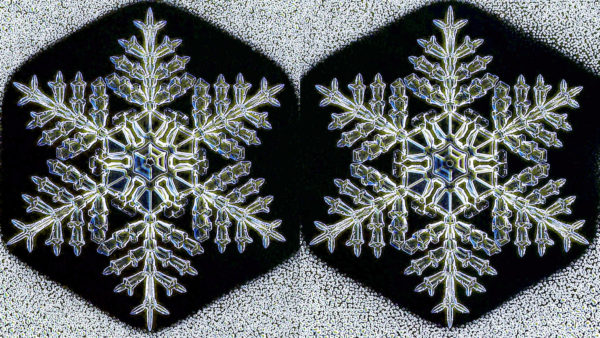 Two nearly identical snow crystals as grown under laboratory conditions at Caltech. Image credit: Kenneth Libbrecht / Caltech / SnowMaster 9000.
Two nearly identical snow crystals as grown under laboratory conditions at Caltech. Image credit: Kenneth Libbrecht / Caltech / SnowMaster 9000.
Even grown under laboratory conditions, these snowflakes aren't identical. Similar, yes, but even from this low-resolution image, you can see tiny imperfections that indicate differences. So it is with every special snowflake you encounter, no matter their political persuasions.
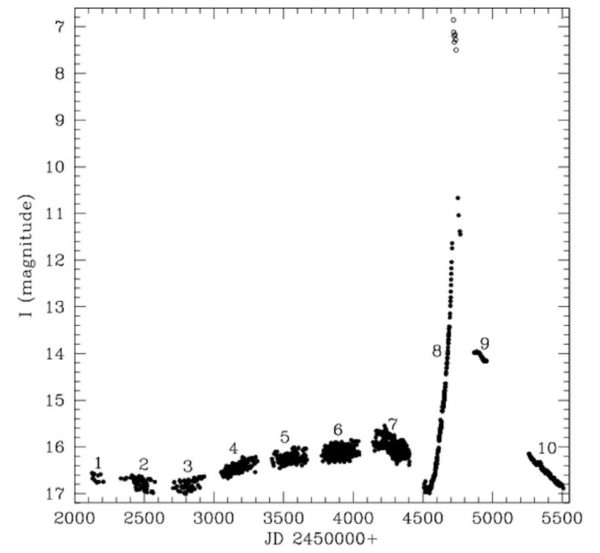 The light curve over time of V1309 Scorpii. Image credit: V1309 Scorpii: merger of a contact binary - Tylenda, R. et al. Astron.Astrophys. 528 (2011) A114.
The light curve over time of V1309 Scorpii. Image credit: V1309 Scorpii: merger of a contact binary - Tylenda, R. et al. Astron.Astrophys. 528 (2011) A114.
From Omega Centauri on stellar mergers: "How well have stellar mergers been simulated? And if so there must be a rough timespan for the various phases of the event, something like initial nova-like flash, then there must be a period where the star contains two cores, which eventually merge, then after a while it should settle down into a higher mass star."
The best information comes from observations, not simulations. Measuring the various stages is the best way we get data; simulations in this regard are only as good as the models that go into them. The "flash" you allude to is lower in magnitude than the eventual brightening, which lasts for months, and then settles down over a period of a few years. But for more detail than that, you need better observations; without data to guide you in a process this complex, there's a limit to what theory and simulations can tell you.
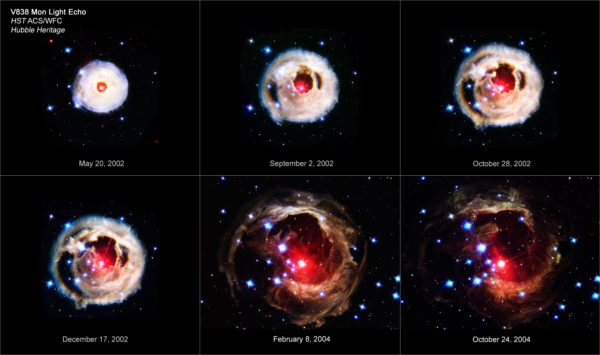 After the initial flash, the light and ejecta both spread outwards, creating a spectacular blooming 'cosmic rose' from star V838 Monocerotis. Image credit: NASA / ESA / Z. Levay (STScI).
After the initial flash, the light and ejecta both spread outwards, creating a spectacular blooming 'cosmic rose' from star V838 Monocerotis. Image credit: NASA / ESA / Z. Levay (STScI).
From Sinisa Lazarek on the Hubble images of V838 Monocerotis: "The last picture in the post (the light echo)… wow… amazing. So much detail is visible!"
I think this is one of the best Hubble observations ever taken. What an unusual, beautiful star. If this was a luminous red nova, the 2022-ish merger of the stars in Cygnus that we're predicting should confirm it in the most incredible of ways.
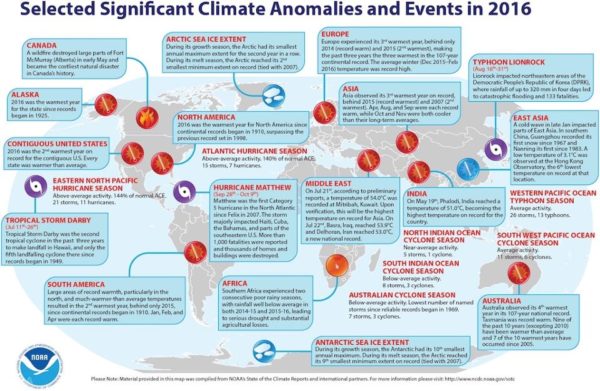 The effects of climate change and global warming are apparent all over the globe. Image credit: NOAA, retrieved from http://www.noaa.gov/stories/2016-marks-three-consecutive-years-of-recor….
The effects of climate change and global warming are apparent all over the globe. Image credit: NOAA, retrieved from http://www.noaa.gov/stories/2016-marks-three-consecutive-years-of-recor….
From t marvell on climate change effects: "Let’s face the facts: deadly climate change is going to happen no matter what."
I don't know where the future tense in your comment is coming from. Peru's agricultural industry is destroyed. We are seeing category 5 tropical storms where we've never seen them before. Sea levels are rising; even the most strident climate change deniers aren't rushing to buy up land in southern Louisiana. It's real, it's impacting large swaths of the Earth, and everyone can see it. Accepting the science has to be a starting point we can all agree on.
Global land and global ocean surface temperature anomalies. Light lines are 12-month running means and heavy lines are 132-month (11-year) running means. Image credit: "Global Temperature in 2016", J. Hansen et al. (2017), via http://www.columbia.edu/~jeh1/mailings/2017/20170118_Temperature2016.pdf.
From Denier on his own views on climate denial: "
[1] the Earth is warming
[2] it’s human-caused
[3] burning fossil fuels is the major contributor
[4] we need to do something about itThe first 3 points are tired to the point of being vapid. It’s meh and gets more meh with each telling."
Great! So you accept these first three points, unequivocally. In fact, you accept them so thoroughly that you think everyone should accept them. I hope you'll join that fight. Here's a new hashtag for you, then: #NotAllDeniers.
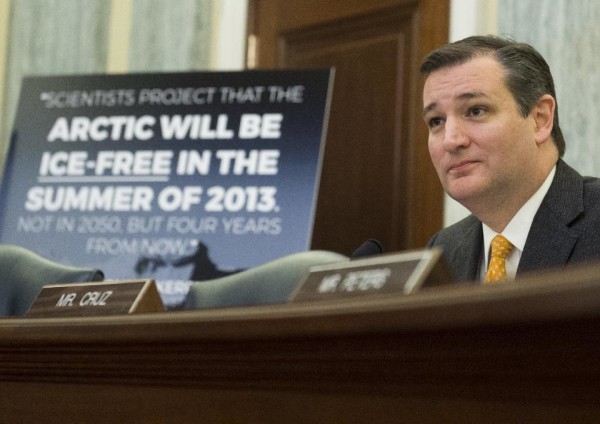 Ted Cruz, with a loaded statement from a questionable science news source, during a hearing on climate change on December 8, 2015. Image credit: SAUL LOEB/AFP/Getty Images.
Ted Cruz, with a loaded statement from a questionable science news source, during a hearing on climate change on December 8, 2015. Image credit: SAUL LOEB/AFP/Getty Images.
From Chuck on his views on climate denial: "I disagree with the view that all GW is caused by man, but whatever; it is some uncertain percent.
There is little evidence, none decisive, that the GW is Catastrophic. That is where the disagreement with most skeptics/lukewarmers lie. The main “evidence” for high sensitivity are the models, which are neither validated or verifired.
In any case models are not evidence. In fact their prediction for a temperature increase have been too high from the get-go.
Consider the ideas/data of knowledgeable people like Lindzen or Nic Lewis. Then make up your own mind."
So... Denier? Where are you on this one? Where are you telling Chuck that the overwhelming majority of warming is caused by humanity? Where are you explaining the science of greenhouse gases and carbon emissions? Where are you refuting the scientifically invalid statements of Lindzen, who claims no warming since 2001?
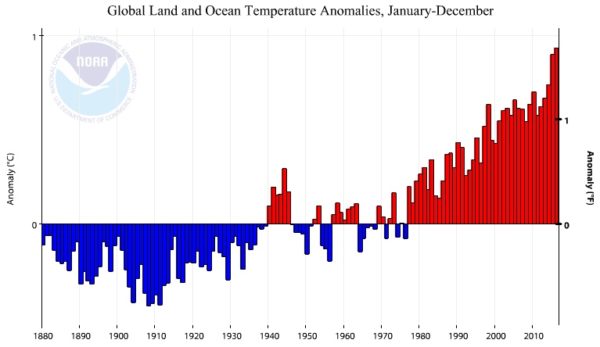 At an average warming rate of 0.07º C per decade, the Earth's temperature has not only increased, but continues to increase without any relief in sight. Image credit: NOAA National Centers for Environmental information, Climate at a Glance: Global Time Series, published January 2017, retrieved on January 18, 2017 from http://www.ncdc.noaa.gov/cag/.
At an average warming rate of 0.07º C per decade, the Earth's temperature has not only increased, but continues to increase without any relief in sight. Image credit: NOAA National Centers for Environmental information, Climate at a Glance: Global Time Series, published January 2017, retrieved on January 18, 2017 from http://www.ncdc.noaa.gov/cag/.
Who also claims that 2016 isn't the hottest year on record, who the year before claimed 2015 wasn't the hottest year on record, and so on?
I know you have been around long enough to see me engage in fighting the good fight against both political sides when they get the science wrong. You've seen me take on anti-GMO advocates, you've seen me take on the anti-fluoridationists, you've seen me go after the anti-nuclear power crowd. If you are a fan and advocate of science, that means standing up to members of your own political side when they are wrong about the science. I didn't even know who Nic Lewis was, by the way, so I looked him up. Holy crap.
Our climate isn't the only thing that matters, of course, but if you care at all about the future of Earth, its humans and its non-human inhabitants, this is an issue you'll advocate for doing something positive about, whether it's big or small.
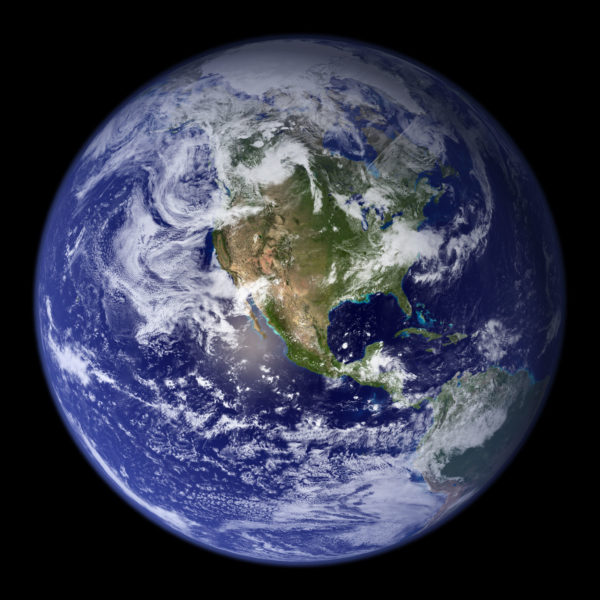 The Earth, our fragile blue planet, as composited by the Moderate Resolution Imaging Spectroradiometer (MODIS) instrument aboard the Terra satellite. Image credit: NASA's Earth Observatory.
The Earth, our fragile blue planet, as composited by the Moderate Resolution Imaging Spectroradiometer (MODIS) instrument aboard the Terra satellite. Image credit: NASA's Earth Observatory.
From Denier on one true thing and one false thing: "There is also a school of thought that there cannot be a complete lack of mass extinction events if complex life is to come into being. If the climate is too constantly benign, all you get is a planet of slime."
There is a school of thought that extinctions are required. If one species reaches the top of the food chain (or fills a niche) with no competitors and no other changes occur, it may never be displaced. But organisms tend to poison their own environments if they thrive too well. Yeast cells in an endless supply of sugar will acidify their environments until they all die off. Predators in an area rich in prey with no competitors will thrive and reproduce and devour everything until their own survival is threatened. And where life thrives the most, diversity arises the most. The jungles, for instance, cover only 6% of the Earth's surface, but contain 50% of all land species.
Mass extinctions are an accelerator or a catalyst of evolution in some sense, but in no sense is it a requirement for complex life to emerge. But an unchanging climate will still see tremendous evolutionary changes; climate is not even usually the driver as far as we can tell.
 A famous depiction of the creation of man. Image credit: Michelangelo, Sistine Chapel ceiling, via Wikimedia Commons.
A famous depiction of the creation of man. Image credit: Michelangelo, Sistine Chapel ceiling, via Wikimedia Commons.
From Omega Centauri of proving the existence of God: "Someone once said (I think it was a recent pope), that if there was proof, then you couldn’t have such a thing as faith, because faith means believing in something you can’t prove."
That is the opposite point of the one I made, and I suppose it's equally valid. The question I had asked relevant to this point was:
If we don’t find life in the places and under the conditions where we expect it, can that prove the existence of God?
And the answer, of course, is no. You can argue about what the evidence favors or disfavors; you can look at the beauty of the world and the values of the fundamental constants and the laws that exist and so on. You can conclude that the Universe is such that it admits the possibility of intelligent life forming. And it did; we're here. There is no step where divine intervention is clearly, definitively required. And as such, you cannot prove that God must exist. But if your argument is, "life on Earth is unique in all the Universe, and therefore God exists," not only is that awful logic, but your faith will be shattered the moment we find life beyond Earth. Not a good way to go.
Reaching, broadcasting and listening for the evidence of others has so far returned an empty, lonely result. Image credit: Victor Bobbett.
From John K. on God as a playwright: "About God, if we start from the Jewish/Catholic viewpoint that God is not of the universe, there would be literally no way for us to connect with him from here, on our own: the characters in a Shakespeare play could never know the poet; the figures in a Rembrandt painting could never know the artist or understand his mode of life. Unless he paints himself into the picture or writes himself into the play, that is. Like, say, in a Resurrection scene."
Even if Shakespeare wrote himself into the play, would he be recognizable as the playwright, or would he be indistinguishable from any other character? If Rembrandt painted himself into a Rembrandt painting, would you recognize him as the artist, or would he appear as just another figure? And if God inserted himself into the Universe, would it be universally recognizable as God, or would it merely be indistinguishable from any of the other things that came to be, naturally, in this Universe? I submit that you'd need more than a playwright in a Shakespeare play, a painter in a Rembrandt composition or a human observed to be resurrected at a time when our medical knowledge was what it was 2000 years ago to recognize an outside influencer. But your mileage may vary.
From Pat Mccormick on noetics: "Professors at Princeton have been studying Global Consciousness for several years. They have some positive results. If you’re interested: http://noosphere.princeton.edu/"
So a few years ago, there was a creationism/science debate between Bill Nye and Ken Ham. And there were 22 questions that creationists had for those who believed in evolution; number 7 was about noetics. Here's the full link to my responses, but I've included the response to that question below.
Now, I’ll confess, I had to look this one up. I had been under the impression that noetics was only something that Aristotle wrote about, but a little research shows that it’s actually about: “how beliefs, thoughts, and intentions affect the physical world.” Well, this sounds like an interesting question: do beliefs, thoughts and intentions affect the physical world? And if so, how?
The 'institute of noetic sciences', or IONS, is where the Princeton link eventually leads, FYI. Image credit: screenshot from http://noetic.org/.
If you want to show that beliefs, thoughts and intentions actually do affect the physical world, all you have to do is perform a repeatable, quantifiable and measurable experiment that shows that there is an effect. You don’t even need to explain how; you just need to show that there is an effect that you can measure and quantify, and that you can repeat the effect whenever you repeat the experiment. I don’t know of any experiments at present that do this, but if you can find (or perform) them, I’m open-minded.
It's a tall order. It hasn't been done yet, not even once, in a verifiable way. But people are trying. Good luck to you; you'll need it.
Doesn't-Understand-Sarcasm man, from the Abstruse Goose comic 'Undefeated'. Via http://abstrusegoose.com/558.
And finally, from Andreas on winning the argument: "I guess so: http://abstrusegoose.com/558"
I hadn't seen this comic before. Brilliant. And deservingly, the last word. Thanks for participating, and see you all back here next week for more science, more knowledge, more of the Universe and more Starts With A Bang!


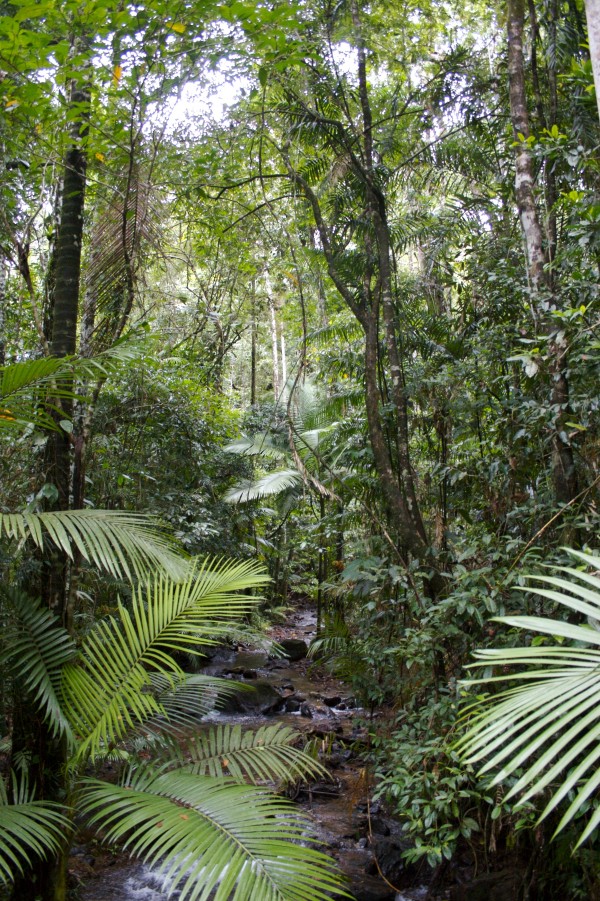
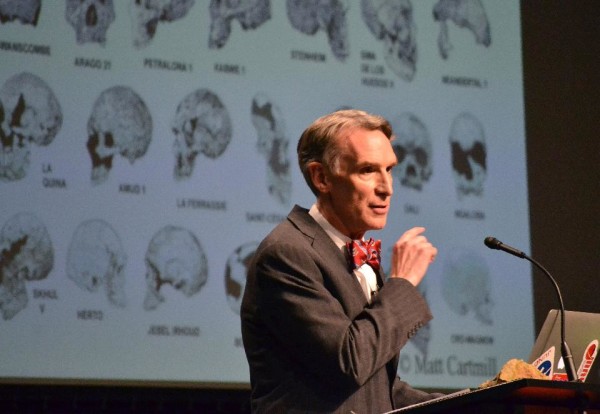
@Ethan
Thank you for giving me so much to chew on. I'll take them in reverse order.
First up is the slime planet and climate:
The first dominant life form on Earth was the green and purple photosynthetic bacteria. They ruled for 2 b-b-b-Billion years. That they can still be found to this very day in Stromatolites shows they didn't toxify themselves into extinction. The climate was stable and evolutionarily resulted in what is referred to as the Boring Billion.
Slime was finally dethroned by a massive climatactic disruption called Snowball Earth which cut off the photosynthetic bacteria from its food source. Evolution kicked into overdrive. By the time the ice cover breaks up to start the Ediacaran we have animals.
Would we have evolved complex life if there had never been the Snowball Earth climate disruption? Maybe. Probably. I don't know. I'll leave that for people smarter than myself, but it is a school of thought and I stand by what I wrote. I would also say the existence of the Boring Billion calls your counter into question.
@Ethan wrote
I'm not much of an Al Gore type, jetting around the world on private planes to tell everyone else to cut back on greenhouse gas emissions. I'm more of a do-er, so I'm buying a Tesla. Did you know that thing has a Ludicrous Mode that will help save the future of Earth in like 2.6 seconds? Ka-Chow!!!
@Ethan
not even your hero Donald Rumsfeld knows that!
Do you have evidence that Denier claimed that Rumsfeld was his hero, or did you make that up? (I did a quick search, but came up empty).
Just by the way, Michael Shermer, SciAm March 2011 came up with one of the worst descriptions of the scientific method I’ve ever encountered:
In all fields of science there is a residue of anomalies unexplained by the dominant theory. That does not mean the prevailing theory is wrong or that alternative theories are right. It just means that more work needs to be done to bring those anomalies into the accepted paradigm. In the meantime, it is okay to live with the uncertainty that not everything has an explanation.
Paradigms are supposed to be adjusted in the light of evidence, not the other way round.
I’ve sometimes wondered if the picture depicting the creation of man on the ceiling of the Sistine Chapel included a self portrait of Michelangelo, to a tiny extent.
@Ethan wrote
You really want to run down these points yet again? Okay. You do great work here and I appreciate the effort you put into responding to not only me but to everyone here, so here goes....
As I have written before, I do believe in point #1.
On point #2, I do believe humans are a contributor but am not ready to conclude human generated forcings represent 100% of planetary warming. That signs of warming have also been observed on other planetary bodies in our solar system over the same time period strengthens that skepticism towards exclusive anthropogenic blame. I am of the opinion the exact percentage owned to athropogenic forgings has yet to be conclusively established with reasonable accuracy. As later in your reply, you somewhat soften the human component to the 'overwhelming majority', I think you understand why I don't unequivocally embrace point #2 as written.
Point #3 is much as point #2. It probably is the major contributor but until they can produce accurate forecasts without error bars there is reason to withhold conclusions on exact percentages.
@Ethan further wrote
The reply I linked to above is a response to, as you put it, someone on my political side. I do like to banter on the science opposing some of the more aggressive climate activism, and hope I can help skeptics be better skeptics.
If you specifically want to talk about Chuck's post, it is mostly fine. He starts off with the same thing I just said about point #2. He then goes into a bit about Catastrophic failure, and I've seen nothing to indicate we're about to end life on this planet, which in engineering terms is what Catastrophic failure means. Climate sensitivity is an active area of research even now, but several billion years of history including some time over 3000 ppm of CO2 indicate Earth's climate is fairly stable. Chuck even admits that GW is real. You may quibble with some of his sources but it is nothing egregious. I *KNOW* you've seen far worse denialist posts than Chuck's.
@Ethan wrote
...And that is why I love your work.
Seriously. Everyone reading this, kick in a couple $$ to @Ethan's Patreon.
@Ethan wrote
I draw a distinction between subject literacy and subject mastery. The idea you are describing goes beyond even mastery. I agree that achieving scientific omnipotence isn't possible. I never said it was. I believe scientific literacy is possible. It is a lower bar, but it is still one based on the adeptness of a particular subject.
Where you and I really don't see eye-to-eye is in how we handle people. I believe that disgusting people can do great things, and wonderful people can be unremarkable. Even more, I believe that practically everyone has pretty parts and not-so pretty parts about them. Choosing to devote one's work to scientific achievement does not automatically bestow a requirement of respect. Do you respect Josef Mengele? I don't.
I'm very granular in my respect. There certainly are people I respect, but there are far more that I respect an aspect of without respecting the whole person. People I don't know, but whose work I'm familiar with often fall in that category.
Your proposal goes even a step further than required respect for a person you don't know. It bestows required respect on all individuals in an entire identity group. That is where I bristle. I like taking people as people.
I admit there is a lot of information now, and even more is coming in so fast that shortcuts are tempting if not required. The shortcut you propose is exactly why fake news seems so much more effective now. Identity groups are stronger. Telling people it is okay to use an identity group as a proxy for knowledge makes the problem you originally highlighted worse. Don't give people an easy out. People are lazy and will take it.
Finally, and completely irrelevant of everything, I want to share this thought from a Women's Day (or whatever it was called) Protester.
https://pbs.twimg.com/media/C2yXLhJVIAIF7nH.jpg
It is sentiment I think we can all agree with.
"the president of the world’s most powerful nation has changed"
I think you mean the "previously most powerful nation".
When it comes to special snowflakes, it's the raging right and trump (who is self centered) that are the big snowflakes.
"Accepting the science has to be a starting point we can all agree on."
Deniers, though, won't EVER accept such a starting point. Hell, they won't even accept a starting point among themselves, only "Anything But Carbon". All else after that is negotiable by what works at the moment.
"If you are a fan and advocate of science, that means standing up to members of your own political side when they are wrong about the science"
Hell, if you're an honest human being, you should do that.
But deniers are partisan, their beef isn't FOR anything, just AGAINST. And this is the current problem with the right wing. They see themselves as unalterably The Good Guys and everyone they don't agree with as The Bad Guys. The left can do that too, but their M.O. differs from there on.
The right see ANYTHING done to stymie The Bad Guys as A Good Thing (ends justify the means), because The Bad Guys (those they are *against*) MUST be stopped. Whereas the left see themselves as The Good Guys, and therefore They Don't Do That, and avoid doing slimy crap to stop The Bad Guys, because that stops them being able to see themselves as Good.
So the right WON'T correct one another if they're in disagreement with someone on "the left", because stopping THEM is more important.
You see the same thing with the religious. When it comes to defending "Christianity" (for example), they're ALL christians to the public. But behind closed doors among themselves, protestants hate catholics, they're not REAL christians, evangelicals hate everyone as being corrupters of REAL christianity, and so on.
And ever since The Southern Strategy from the Republicans, they've had to taken on then embrace this tactic themselves.
And, after 40 years, are killing themselves and paved the way for trump.
"I hadn’t seen this comic before."
Oooh, THAT was what he was trying to say.
So I guess when he posted links to quantum mechanics et al, that was him writing lots of papers to prove me wrong.
Mind you, that bit in the comic doesn't make any sense. If it was "Stayed up all night to *find* papers that prove you wrong", it would be more like reality AND demonstrate a problem (cherry picking papers for a required result) that exists, at least potentially, in internet refutations of sciencey stuff.
But the problem for Andreas, he never said what the axioms were, asked a question on the undefined (see quote at the end), then called whatever made them work "god". But what made them work was him saying that they worked, whatever they were. He's not god. It's really a classic circular reasoning fallacy.
The only axioms I know of science (and, no, Quantum Mechanics isn't one of them) are, and this is off the top of my head, so missing some)
1) There is a consistent external reality
2) Our information about this reality can be perceived by anyone
3) We are liable to be fooled by what we want to be true and miss what IS true (requires #1).
That's it.
#1 means we can repeat an experiment
#2 means we can MAKE an experiment
#3 means we MUST make an experiment
And the quote:
And, lets face it, that was meant to BE the last comment. Andreas said WE should stop it. And he wanted to get in the last dig. Because I had the temerity to go "Uh. Ok?" to a fake genuflection that I'd already said wasn't necessary or working.
He didn't want to stop trying to shoehorn god into something that he had deliberately not defined, then when I wouldn't buy it called me delusional ("so you're god then") and terminally self-obsessed ("sorry I am so unworthy"). You know, make it so he doesn't have to answer because I'm irrational.
Hell, I could be irrational, but that doesn't mean you can't actually answer the point.
I've done that with the irrational many MANY times, even if they've been futile attempts to open up their mind to the problem with their methodology.
Irrationality doesn't mean that the irrational one doesn't have a point and can therefore be ignored.
"Paradigms are supposed to be adjusted in the light of evidence, not the other way round."
You're getting his point the wrong way around.
Those anomalies aren't to be fudged away, but are to be included in whatever change in the current paradigm is made to include these anomalies. See MOND for an example: keeps Newtonian Dynamics and then from the anomalies of galactic rotation speeds, modifies that paradigm to fit it. CDM changes the paradigm.
If the current paradigm can't survive the anomalies, THEN it is dropped. A huge amount of effort went into testing the current paradigm, you don't drop it just because it looks like the galaxies aren't rotating right.
YOU'RE thinking "fudge those anomalies away", HE'S saying "include the explanation *within* the current paradigm, not make up a new one, first".
"That they can still be found to this very day in Stromatolites"
No they can't. Their fossils can.
"Slime was finally dethroned by a massive climatactic disruption called Snowball Earth "
Probably not. They were and are still there, but modified (no longer cyanobacteria, but blue-green algae). What changed things was shitting, most likely. It was another secondary source caused by the appearance of triboplasts.
Clearing away can cause massive increases (though from the Cambrian Explosion, not as massive increase as previously thought) in diversity, and that can make way for a new species. Then again, maybe not. The Cambrian explosion never gave rise to humans, we were a long time later, and we're pretty dominant.
Do you think Sabretooths were happy that their extinction made way for a type of ape to gain ascendancy? Or do you think they would have preferred not to die off?
Deniers are the only species to look forward to extinction if to avoid it means letting the hippies be right.
"As I have written before, I do believe in point #1. "
But CHUCK doesn't. Yet you wanted #1 to be silenced because "nobody" needed to know that, it was rehashing the "tired old debunked meme" that deniers deny it's warming.
But Chuck doesn't accept it. As long as the chucks of the world don't accept it, then point #1 needs to be argued yet more, and there ARE deniers who insist there's no warming.
And by pretending otherwise, you're guilty of shifting the goalposts.
Not to mention avoidance of the ask you were given: Tell Chuck That.
"On point #2, I do believe humans are a contributor"
Later on in the same comment you refute this assertion yourself.
" but am not ready to conclude human generated forcings represent 100% of planetary warming."
Why? We SHOULD be cooling. Therefore it's probably MORE than 100% of the warming.
" That signs of warming have also been observed on other planetary bodies in our solar system over the same time period strengthens that skepticism towards exclusive anthropogenic blame. "
No it doesn't.
When Pluto starts its perihelion, it will globally warm for the next 120-ish years. That doesn't mean earth is being warmed by the same thing,.
Moreover, what do you propose does it? The Sun? We have satellites watching the output of the sun, so no. It can't be that.
This is the problem with you lying deniers. You know you're talking BS, so you don't specify. You leave it up to everyone else to do the wrk of finding out what you may be talking about, then you insist that it's not good enough or you weren't talking about that (see your "I believe in point #1").
And note that this is in opposition to your comment that you accepted people did it.
thank you so much for proving my point *g*
I don't think so. I'm not demanding a perfectly accurate test of some objective quantity. I'm saying if you have things you associate with "scientific literacy", write down how you would test those things. You think someone nedes to show appreciation for science and scientists to be literate. Okay, so what question would you ask to tell the difference between someone who met your criteria and someone who didn't? Come up with a bunch of questions like that. Also come up with a bunch of simple yes-no or multiple-choice questions about science. Give both sets of questions to a sample population. Find out which of the simple questions correlate with the more complicated questions you really want to ask. Then you can use the simple questions to survey the population.
Surely there is some empirical way to distinguish between the people you think meet your #1 and #2, and the people who don't?
***
Denier:
They turned the Earth from anaerobic to aerobic, injecting so much "waste" oxygen into the atmosphere that it permanently altered the atmosphere and drove their form of life figuratively underground, allowing other forms of life to dominate for the next 2 billion years or so. That's not extinction, no, but an analogous outcome with us
-as-them is not an outcome anybody wants.
You make the same sort of straw man dodge in discussing Chuck's point, saying that you see no evidence that we will cause the extinction of all life on Earth. That's a straw man because nobody is claiming that's the outcome we're focused on. We're focused on avoiding the far less "catastrophic," far easier-to-accidentally-produce outcome of making the atmosphere and standard environment toxic or unliveable to mammals like us. So, if I may make a suggestion, stop going on about how we're not going end life on planet Earth. Agreed, we won't. Point won. AGW won't do that. Time to move on. Now discuss the actual concern about AGW, which is that our actions and our waste will cause (and probably are causing) mass extinctions amongst mammals and other species that currently make human habitation comfortable. That's the concern. It's not whether we'll wipe out all life, it's whether we'll wipe out felids and canids and ungulates and marsupials and primates (and etc...) and - through creating a shortage of fresh clean water and arable land - cause some sort of massive population decline in us.
@eric
What color is your world? On Earth the photosynthetic prokaryotes are everywhere. True plants cannot make chlorophyll. They have no genetic information on how to make it. Plants are essentially slave labor camps for photosynthetic prokaryotes. Oxygenation of the atmosphere certainly didn’t kill them and almost everything green is proof. They’ve been doing their same little trick for 3.5-3.8 billion years with no sign of stopping.
They are certainly not the most complex piece of life, but the argument is that further complexity would not have been needed if adversity had not created an environment where additional complexity was required to fill a niche. For a long, long time the stable environment didn’t reward the additional overhead of increased complexity. Simple was good enough for everywhere. That changed with Snowball Earth and evolution has been racing ever since.
Those are precisely the things that are not of concern to the deniers who post here, because they believe those things will hurt others - the poor here and in other countries - about whom they don't give a rat's butt.
The concern the local deniers have is that policy designed to address the aforementioned results might have some influence on their lifestyle - and since they are more important than anyone else, that can't be allowed. That's what science proponents are up against.
Andreas, what point?
That here you're Homer?
https://www.youtube.com/watch?v=pXu9P0KoJQ0
Yeah, well I'm Marge, tubby.
"What color is your world?"
Blue.Yours?
" On Earth the photosynthetic prokaryotes are everywhere. "
But they aren't the cyanobacteria of stromatolite fame. They dead, honey. Evoution means that things evolve, even if it doesn't look like it's changed much: it has to survive in a changed environment. E.g. one with Ozone.
"That changed with Snowball Earth and evolution has been racing ever since."
Proof, plz. Your assertion isn't rebutting ours that indicates you are wrong here.
And can I note that you're again avoiding the issue of Chuck and your claim that "It's not warming" is tired old screed because "nobody" disputes it is getting warmer.
'cept they do.
I'm not disagreeing, but it seems so short-sighted. Given I live in a wealthy nation, have a degree, etc., I expect my great-grandkids will be able to ride out climate change a lot better than the vast majority of humanity. But I still don't want them to grow up in a world without (other) large mammals, rainforests, etc.. To me, destroying those things is an "influence on my lifestyle" just as my tax rate is. I'm sure many insects will do fine with a warmer Earth, but I don't really want my descendants to be talking about whether cockroach is better fried or baked, and yet not know what a wolf is.
Eric, for a start you're not a denier. Secondly you don't have the narrow fixation of the deniers left behind by reality.
THEY don't think that "destroying those things is an “influence on my lifestyle” just as my tax rate is". The animals are in the way. Or a resource to be used up.
I don't understand it either eric, but that's precisely the attitude the deniers who argue about climate change here take.
For comparison: we have a strong infestation of anti-vaccination people in this part of Michigan, and occasionally some will bring up discussions about the "studies" that "prove autism is caused by vaccinations" in the stat courses I teach. Even after the flaws in those "arguments" are pointed out, in detail, and it's been demonstrated that the standard anti-vac stuff is baseless, the response yes "Well yes, but ..." and nothing has changed. Just like the climate change deniers do repeatedly here.
@Wow
Unless you're saying the evolution of photosynthetic prokaryotes into photosynthetic prokaryotes represents "tremendous evolutionary changes", I don't see your point.
Yes, they have massively changed.
Go look yourself.
The atmosphere has changed. There are predators now.There's competition for the same food.
Not all evolutionary adaptations require a change in morphology. They're just easier to see, because we can't see DNA or chemicals by the naked eye.
Just because YOU don't know what the hell you're talking about doesn't mean I have to hold oyur hand through reality. Go look.
Yes this appears true. You seem to think that there is no lesson or warning to heed about cyanobacteria causing the first great extinction and massively changing the atmosphere because as far as you're concerned, hey there's still cyanobacteria around! Meanwhile the rest of us think that an analogous change caused by humans would be a horrendously bad thing, making life extremely hard and unpleasant and wiping out many many current species. But not humans, so everything's okay as far as you're concerned!
I would even personally call that sort of result 'catastrophic,' but it would not fit your definition of catastrophic because evidently you want to reserve that word only for events that would wipe out all life on Earth.
And this is what makes your position largely untenable and ridiculous, IMO. When we point out that in the past, species have produced so much waste that they've altered the earth's climate and ecosystems and thus caused mass extinction events, you think a reasonable counter-argument is that hey those creatures are still around in some form, so you don't care. And when someone says a human-created mass extinction event would be catastrophic, you reply that it's not really catastrophic because life on Earth would continue. In terms of potential climate change, are those really the only outcomes that concern you? Humans make it and some sort of life survives?
Denier, there is a very real chance that if climate change continues at the rate it's currently proceeding, hundreds of millions of humans will perish. There is also a smaller but still existent chance that humans will go extinct.
The fact that you can't (or more likely, don't want to) grasp this is part of the problem.
re: signs from saturday's march
this one is great as well :) http://d2118lkw40i39g.cloudfront.net/wp-content/uploads/2017/01/tumblr_…
Of course, Denier would be the last one to be phlegmatic about death and decide to leave early. After all, that's not catastrophic, but he doesn't want to be dead for some reason. Apparently he doesn't think anything less than a catastrophe is worth worrying about unless it hits him personally.
IOW he's a selfish little prick with no human decency.
@Sinisa Lazarek
That is a great one. There seems to be such a divide in society. I'm glad there are people out there who still try to inject positive fun.
@Julian Frost
Bring the science. Don't just repeatedly spout it. Show me your basis for making this outlandish claim.
@eric
My definition is valid. Your definition is valid. I didn't choose the word. @Ethan wanted to know why I didn't jump down the throat of another poster who used the word. I didn't attack him because the statement could be construed as true. Arguing over whose valid definition is more valid is ridiculous and wasn't worth the effort. Petty stuff like that is what @Wow is for.
As for the cyanobacteria, it was a completely separate thought from a completely separate piece. Furthermore that event is a poor analogue for human caused climate change.
"My definition is valid. Your definition is valid. I didn’t choose the word"
Yes you did. You chose YOUR definition on OTHER PEOPLE'S use of the word. But who could expect a moron denier to accept reality, eh?
"Show me your basis for making this outlandish claim."
http://ipcc.ch
Moron.
@Wow
Nice try. Read it and all ARs before it. Nothing in there says hundreds of millions or possibly even all human life will be wiped out by GHG warming.
Yeah, odd that. You read words and then insist that they can't be considered and their impact be inferred.Unless, of course, it's to be inferred that decarbonisation or doing anything abut AGW would cause massive catastrophe and the world collapsing...
Because you are a lying crapsack.
But what do you think about the amount of sea level rise of 70m or thereabouts? How much humanity is there living within 70m of ASL?
What do you think about hurricanes and droughts, movement of the fertile belt from long-nourished soil to impoverished soil further north?
Are you going to sit there on your pampered ass and claim that there will be no deaths from the consequences of AGW left alone???
Right. Try it, cupcake. Prove to everyone how little you want to think when it comes to something you don't want to do and won't benefit you immediately.
You poor excuse for a human being.
"even all human life will be wiped out by GHG warming."
Really?
Fucking put those goalposts BACK you lying sack of shite.
Hey, moron, show us where it talks about catastrophic AGW in the science reports.
a little development in the way of tackling fake news
http://www.bbc.com/news/uk-38714404
@Sinisa Lazarek
It is an interesting effort but I fear misses the crux of the problem. The more sophisticated aggrigators and distributors of news such as Facebook do so on a targeted basis. If you are interested in cars, you get news on cars. If you like a particular sports team, you get news relating to that sports team. etc.
The people receiving the bits of fake news of the type so being whined about by the politically passionate, are receiving that type of content because that is the content they want. That is the content of interest. People like to have their already held views affirmed. Teaching people how to detect fake news isn't as important as getting them to want to reject it.
Yeah, it;'s not like pizzagate was fake, was it, and didn't lead to some armed nutjob running around CONVINCED there was a basement with abused slave children in it...
No, nothing REALLY happened, fake news was just those whiney crybabies being sore.
FFS, denier, you really are a drain full of shit.
WINNING!!!
http://www.zerohedge.com/news/2017-01-24/trump-bans-epa-employees-using…
This is exactly the discussion that should be had before deciding on policy. What will action or inaction influence?
Here are some facts you may not know:
Regardless of any treaties such as the Kyoto Protocols or Paris Accords, nations are going to do as they will. If the US signs one or doesn’t sign one, it doesn’t matter. Our carbon emissions are going to go down because our continued technological advancement and slowing population growth won’t allow it to be any other way. China’s carbon emissions are bound to spike up in the short term as more of their population joins the 21st century, but in the long term they’ll fall for the same reasons that we are. The world is a little further behind but it will be the same story there too. Carbon emissions are going to fall. Not immediately, but it will happen even without advocacy or binding agreements.
Being that productivity gains and population collapse are going to take care of the problem, the costs of proposed solutions are the main concern. I do value my freedoms, but even more I worry about crippling the economy in the name of CO2. People with nothing to lose are dangerous. I genuinely believe that if all working age adults in the world had gainful employment there would be no terrorism. Men and Women living in squalor is a much greater threat. If I have to weigh the two against each other, there is no question. Do what you can to boost the global economy and let CO2 fall naturally with productivity gains and population decline.
@Wow wrote:
Did I mention that my wife is insanely hot?
https://www.youtube.com/watch?v=Ok1nWNw7t30
"Fact #3 – The total fertility rate (CHILDREN BORN/WOMAN) in China is 1.6"
Lie.
China enforces a one-child-per-family. So any difference above 1 is going to have to be from infant deaths and so forth.
Basically, I've heard from deniers "Don't trust China PR", I don't trust deniers' PR.
"Did I mention that my wife is insanely hot?"
Cool story, bro. She a supermodel too?
@Wow
China relaxed its one child policy in 2013.
Only partly in the case of female children, because the problem was killing girls because of patrimony.
Which is a bit daft, because most of the genetic material is passed on by the female line, not the male one. And that 1.6 is still going to be major bollocks. Not every woman has a child.
Oh jeez, the only people who worry about crap like birth rates and population are the disgusting racists who go on to say "those (fill in the bogey man race of the day here) will soon take over the world".
Afraid to see what nonsense will come next from the resident science denier.
Because of birth rates and population the Deans will soon take over the world.
https://www.youtube.com/watch?v=XZde5VDAA8U
No, we're safe. You will have progeny as moronic as yourself and you'll die off when you decide that evil liberals had insisted on putting those warning labels on everything to harm the profits of corporations, and you'll all die in some weird spatula mishap.
We'll read about it in the funny papers.
Dean, what is it with these creepy rightwing assholes, thinking they're delish and gabbing on about how satisfied they are with their junk as if they're not hugely worried about their genetic heritage?
I have a very strong feeling from these posts and others you've made, denier, that I'm much more on the ball about things than you are.
What, exactly, is your concern about the birthrate non-issue?
"what is it with these creepy rightwing..."
I think it has to do with their libertarian "philosophy" - a fancy name for the spoiled spoiled five-year old's attitude of "I deserve everything and nobody else should have anything." That, coupled with fact that even though they took advantage of the infrastructure society put in place to get to their position in life, they don't believe anyone else should have access to the same chances. The racism comes along for the ride.